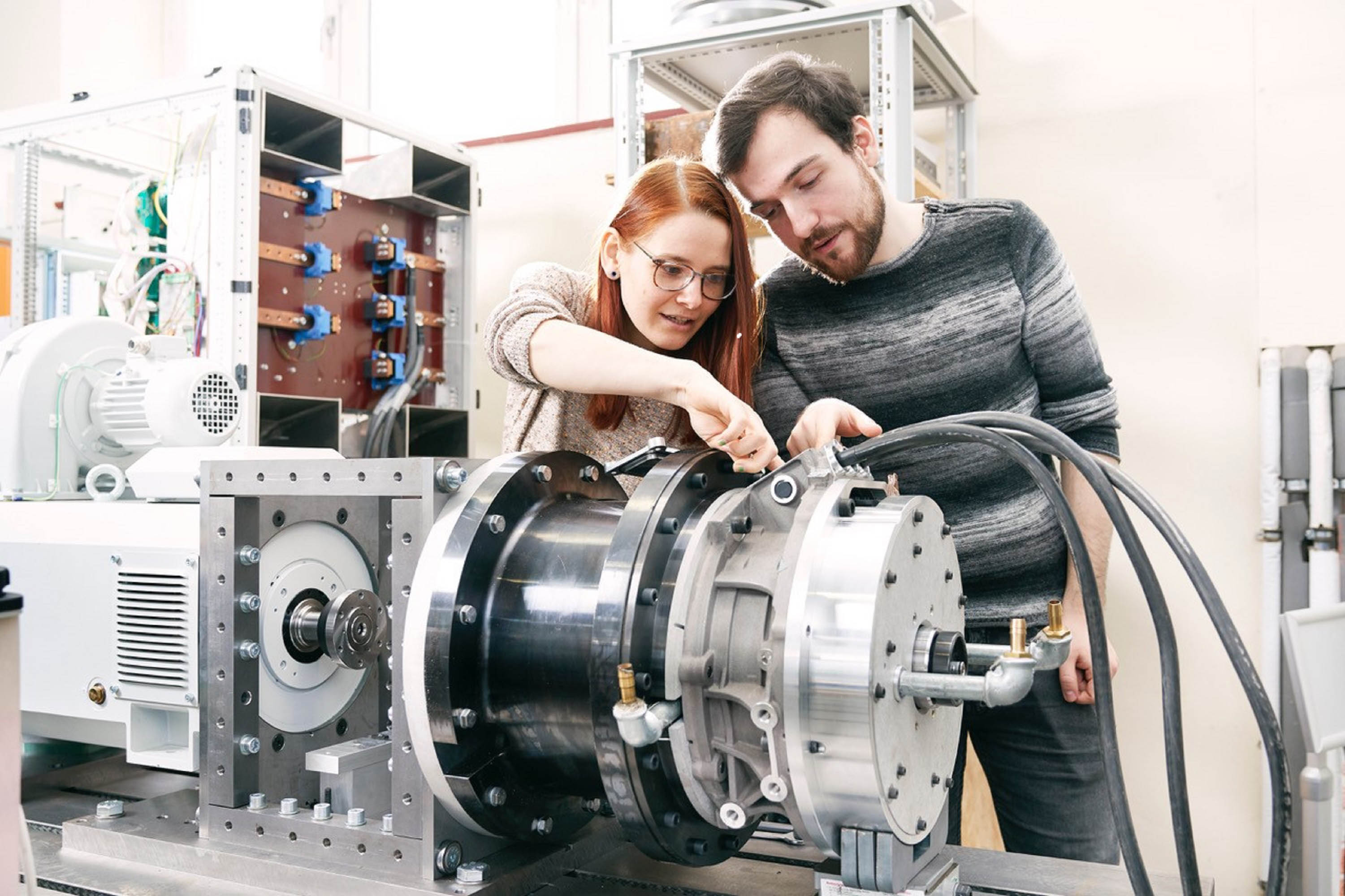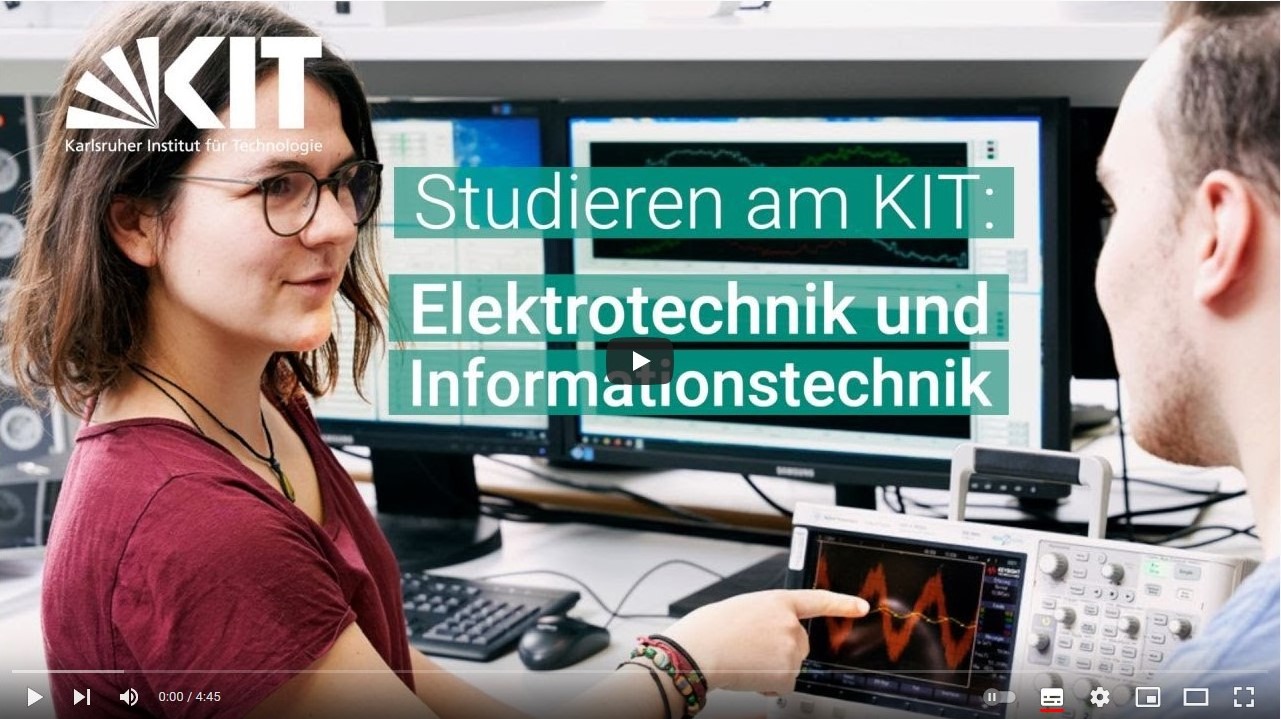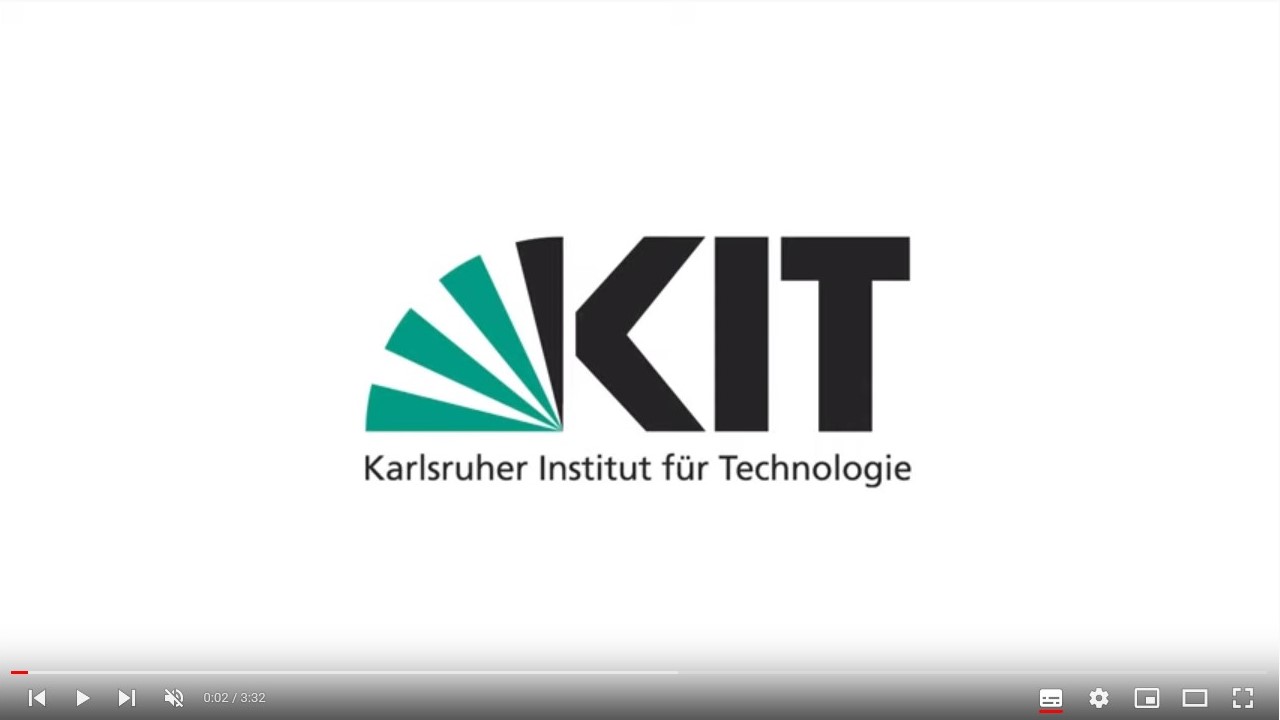Degree: Bachelor of Science (B.Sc.)
Regular program length: 6 semester (full-time program)
Credit points (ECTS): 180 credit points
Language of instruction: German
Higher semester: no
Higher semester: winter and summer term
First semester: September 15
Higher semester: September 15 for winter term, March 15 for summer term
First semester: July 15
Higher semester: July 15 for winter term, January 15 for summer term
Program details
What is it all about?
Electrical Engineering and Information Technology now permeate all areas of our lives. Automation, electrification and digitalization characterize today's world, from electromobility to assistance systems in elderly care. The bachelor's degree program in Electrical Engineering and Information Technology at KIT teaches the mathematical, physical and technical fundamentals needed to understand how things work and to develop new products. A compulsory area with mathematics, physics and the basics of electrical engineering and information technology forms the basis for application-related subjects and later specializations. The implementation of what has been learned is planned in workshops, project work and a professional or research internship. Further specialization is possible in a subsequent master's degree program.
Program structure
During your studies, you have various subjects, which consist of one or more modules. A module deals with a specific topic and consists of one or more courses. In the module handbook for your degree program, you will find a description of the modules and their subject assignment as well as a study plan. This gives you an orientation as to which courses you should attend in which semester in order to complete your studies within the standard period of study. It takes into account a balanced distribution of courses over the individual semesters. It also ensures that you are first taught the important basics before moving on to more advanced topics. Your individual course of study may differ from this.
In the first semesters, you will mainly acquire the fundamentals of mathematics, electrical engineering and information technology that are important for your degree program. In addition to the fixed modules of your foundation studies, you have a number of options, particularly in the higher semesters. From the 3rd or 4th semester, you decide on a specialization in the form of a compulsory elective subject. The following subjects must be completed on the course:
- Mathematical-Physical Foundations (42 CP): in this subject, you will learn the relevant mathematical foundations of your subject, such as Higher Mathematics and Probability Theory.
- Electrical Engineering (28 CP): this includes Linear Electrical Networks, Electronic Circuits and, for example, Electromagnetic Fields and Wwaves.
- Information Technology (33 CP): your fundamentals are rounded off with knowledge of Digital Technology, Information and Aautomation Technology, Measurement and Control Technology and the Fundamentals of Automation Technology.
- Project Work (8 CP): here you will learn the rules of scientific practice and scientific methods in a small group of up to five students using the example of a project topic, which you can choose from a wide range.
- Interdisciplinary Qualifications (3 CP): in addition to your specialist training, you can acquire additional interdisciplinary qualifications. Benefit from the huge range of courses offered by KIT. Be it language courses, an examination of social issues, presentation or writing techniques or simply a course that is conducive to your work-life balance. You can choose freely.
- Compulsory Elective Subject (36 CP): you choose one of the following specializations:
- Electrical Energy Systems and Electromobility
- Information and Communication Technology
- Automation, Robotics and Systems Engineering
- Microelectronics, Photonics and Quantum Technologies
- General Electrical Engineering and Information Technology
- Electrical Energy Systems and Electromobility
Internship
The bachelor's degree program in Electrical Engineering and Information Technology includes a 12-week internship, which is usually completed in the 5th and 6th semester. You can choose between an industrial internship and a research internship. The search for an internship is your own responsibility. The KIT Career Service or the university group IAESTE can help you find an internship. The research internship can also be completed at a KIT institute. Of course, you can also complete the internship abroad if you wish. The possible contents can be found in the internship guidelines for the degree program. The Praktikantenamt will be happy to help you with the planning.
Stays abroad
KIT offers a wide range of options for stays abroad, from individual courses to a year abroad. Especially if you are interested in a longer stay abroad, it is advisable to contact the International Students Office early on.
The KIT Department of Electrical Engineering and Information Technology even offers a double degree program with the University of Budapest, as well as a double degree program with the University of Grenoble in France, comprising the bachelor's and master's degree programs.
Bachelor's thesis
At the end of your bachelor's degree, you will complete your bachelor's thesis (15 CP), an academic paper that allows you to apply and deepen the knowledge and skills you have acquired. It usually deals with a specific topic in your field of study and requires independent research, analysis and writing. The maximum duration of the bachelor's thesis is six months. The bachelor's thesis can also be completed externally, for example in a company. The bachelor's thesis also includes a presentation of your results.
Additional information
In addition to the module handbook, our booklet about the study program is a useful source of information. It also covers topics such as the application procedure, starting your studies and career prospects.
Qualification profile of the graduate
The Bachelor's degree program serves to impart scientific fundamentals and methodological competence in electrical engineering and information technology.
Studies are aimed at enabling students to successfully pass a Master's degree program and to apply the knowledge acquired in the respective professional field.
Mandatory subject modules convey the basics for studies of electrical engineering and information technology and form the theoretical background for advanced Master's degree programs.
The student can choose an area of specialization by selecting elective modules.
Career prospects
The bachelor's degree is your first professional qualification. If you don't want to deepen your knowledge in a master's program, you can go straight into a career. There are numerous opportunities in industry, public authorities, IT companies, engineering offices or construction companies. Areas of application include energy technology, automation, medical technology, micro- and nanoelectronics, aerospace technology, automotive engineering, communications technology and much more. The activities range from the development and optimization of products or the installation and maintenance of systems to sales and management. In Electrical Engineering and Information Technology, the number of vacancies has exceeded the number of job seekers for years.
Characteristic features of the degree program
Characteristic features of Electrical Engineering and Information Technology B.Sc. at KIT
- scientific depth in combination with practical components
- holistic approach (project work)
- numerous international cooperations (Eucor, ERASMUS+ etc.)
- double degree programs with BME Budapest and INP Grenoble
- extensive orientation phase for first semester students
- learning support through MINT-Kolleg and tutorials
What KIT has to offer
- central campus close to the city forest and right next to the city center
- orientation week before the start of lectures
- 24-hour library offering single and group working places
- wide range of inexpensive catering options (dining hall, cafeteria, Koeri and Pizzawerk)
- numerous interdisciplinary offers for personal and professional development, e.g. Lernlabor, Schreiblabor and Perspektivenlabor
- study abroad, e.g. via Erasmus
- excellent university sports facilities with a large selection of sports
- comprehensive cultural offerings with university orchestras, choirs and theater groups
- extensive support for career entry and self-employment
- Lernraum app
- internationally oriented degree programs and diverse exchange programs
- modern laboratories and practical teaching methods
- diverse student initiatives, clubs and opportunities to actively participate in campus life
- stay in touch after graduation via the alumni network
Admission requirements
Higher education entrance qualification (HZB)
Germans and persons of equal status to Germans (i.e. EU/EEA nationals and non-EU/EEA nationals with a German higher education entrance qualification) are entitled to study at KIT if they have one of the following qualifications:
- General higher education entrance qualification (Abitur)
- (relevant) subject-restricted higher education entrance qualification (not Fachhochschulreife)
- Delta examination of the University of Mannheim (for holders of a Fachhochschulreife)
- recognized advanced vocational training (e.g. master craftsperson) or vocational training, professional experience and aptitude test for those with professional qualifications
For further options, see §58 of the "Landeshochschulgesetz" (State Higher Education Act).
Please note: German nationals with a foreign school-leaving qualification must have the relevant "Regierungspräsidium" (regional authority) certify that their qualification is equivalent to the German Abitur.
For non-EU/EEA nationals with a foreign school-leaving certificate (hereinafter also referred to simply as non-EU/EEA nationals), the school-leaving certificate from some countries is recognized as a direct university entrance qualification in Germany. In many cases, however, in addition to the school-leaving certificate, a university entrance examination and/or a successful year of study in the home country and/or the "Feststellungsprüfung" must be proven with valid documents in order to be allowed to study a bachelor's degree in Germany. You can find the country-specific regulations in the DAAD admissions database or on the Anabin website (in German only) of the "Zentralstelle für ausländisches Bildungswesen" (Central Office for Foreign Education). Further information is available from the International Students Office.
Language requirements and certificates
For the bachelor's degree program in Electrical Engineering and Information Technology, you need sufficient knowledge of the German language. Your German language skills must correspond to at least level C1 of the Common European Framework of Reference for Languages (CEFR).
Proof of sufficient German language skills
Your higher education entrance qualification (HZB) is sufficient proof of your German language skills,
-
if you obtained it at a German-speaking school in Germany or abroad,
-
if you are a graduate of a bilingual secondary school in Germany or abroad and have passed a bilingual German examination, such as the AbiBac or the Gemischtsprachiges International Baccalaureat (GIB) or
-
if you graduated from a foreign school, but there is another official agreement with the respective country on the recognition of your school-leaving certificate or language certificate as proof of language proficiency for university studies in Germany.
A complete list of foreign school-leaving qualifications and language certificates that are recognized as proof of sufficient German language skills can be found on the website of the Kultusministerkonferenz (Standing Conference of the Ministers of Education and Cultural Affairs of the Länder in the Federal Republic of Germany).
If you did not obtain your higher education entrance qualification at a German-speaking institution, you must provide a separate language certificate - regardless of your nationality. Only the following are accepted
- the passed „Prüfungsteil Deutsch“ of the Feststellungsprüfung,
- the passed DSH with the overall result DSH-2,
- the passed TestDaF level 4 in all four parts of the exam (reading comprehension, listening comprehension, written expression, oral expression) or
- a comparable, recognized certificate of sufficient German language skills.
To find out which other recognized certificates can be accepted as comparable by KIT, please contact
- as a German or German-equivalent applicant: Studierendenservice
- as an applicant with non-EU citizenship: International Students Office
Please note:
Language certificates are extremely important application documents that can prevent your enrollment if you do not submit them on time. Therefore, check early on in the application process whether you have the necessary language certificates for your degree program and, if necessary, plan to take one of the language tests mentioned above. The deadline by which you must submit language certificates corresponds to the enrollment deadline stated in your admission offer. In justified cases, you can apply for an extension of this deadline. The extension can be granted until the start of the lecture period at the latest.
Additional necessary requirements for enrollment
For Germans and those with German equivalent status, an additional necessary requirement for enrollment is proof of participation in a study orientation test (e.g. www.was-studiere-ich.de) or a study orientation consultation in accordance with §7 of the "Landeshochschulgesetz" (State Higher Education Act), e.g. by the Student Advisory Service (ZSB) of KIT. Non-EU/EEA nationals do not have to provide this proof.
Application portal
Application for the 1st semester
not possible
Application for a higher semester
Prepare for your studies
- all year round Information events of the Student Advisory Service (ZSB) on your desired degree programs, application and admission as well as starting your studies
- Try out KIT - clarify your interests and support your study decision by taking advantage of the diverse summer offers or participating in taster lectures.
- Campus Day: experience the campus live (together with your family) in spring and make your first personal contacts with the departments and their students
- Studieninformationtag: visit KIT on the state-wide study information day in November and experience the lecture hall feeling for the first time
- topMINT: you don't know yet what you want to study and need to bridge the summer? Take advantage of our orientation semester before you start your studies.
- Use our central online portal studienstart.kit.edu with all the important information and services you need to prepare for your studies and your first semester at KIT. Be it preparatory courses, study-related courses or mentoring programs.
- Orientation phase before the start of lectures - from students for students to get to know KIT, your fellow students and your student council. You will receive specific information on this when you enrol.
- You will be welcomed by KIT with a colorful supporting program at the welcome event for first semester students. You will receive the invitation after your enrollment.
Contacts
Student advisor
Student Advisory Services (ZSB)


Karlsruher Institut für Technologie (KIT)
Zentrale Studienberatung (ZSB)
Engelbert-Arnold-Str. 2
76131 Karlsruhe
Karlsruher Institut für Technologie (KIT)
Studierendenservice
Kaiserstr. 12
76131 Karlsruhe
First point of contact for international applicants
Karlsruher Institut für Technologie (KIT)
International Students Office (IStO)
Adenauerring 2
76131 Karlsruhe
Printed matter
Module handbook
Statutes and regulations
| Titel | Stand | Download |
|---|---|---|
| 2025 KIT 071 Satzung zur Änderung der Zulassungs- und Immatrikulationsordnung des Karlsruher Instituts für Technologie (KIT) | 20.11.2025, veröffentlicht 20.11.2025 | |
| 2025 KIT 060 Neubekanntmachung der Zulassungs- und Immatrikulationsordnung des Karlsruher Instituts für Technologie (KIT) | 08.10.2025, veröffentlicht 08.10.2025 |
| Titel | Stand | Download |
|---|---|---|
| 2025 KIT 021 Zweite Satzung zur Änderung der Studien- und Prüfungsordnung des Karlsruher Instituts für Technologie (KIT) für den Bachelorstudiengang Elektrotechnik und Informationstechnik | 05.03.2025, veröffentlicht 07.03.2025 | |
| 2025 KIT 012 Satzung zur Änderung der Studien- und Prüfungsordnungen des Karlsruher Institut für Technologie (KIT) aufgrund der Neugestaltung der Abschlussdokumente | 26.02.2025, veröffentlicht 27.02.2025 | |
| 2023 KIT 042 Studien- und Prüfungsordnung des Karlsruher Instituts für Technologie (KIT) für den Bachelorstudiengang Elektrotechnik und Informationstechnik | 28.04.2023, veröffentlicht 28.04.2023 |
Teaching calendar and course catalog
WT 2025/26
10-27-2025 to 02-21-2026
ST 2026
04-20-2026 to 08-01-2026
WT 2026/27
10-26-2026 to 02-20-2027
ST 2027
04-19-2027 to 07-31-2027
WT 2027/28
10-25-2027 to 02-19-2028
ST 2028
04-18-2028 to 07-29-2028
Lectures will not take place:
- from 12-24 to 01-06
- the week after Pentecost
- on all public holidays in the state of Baden-Wuerttemberg









